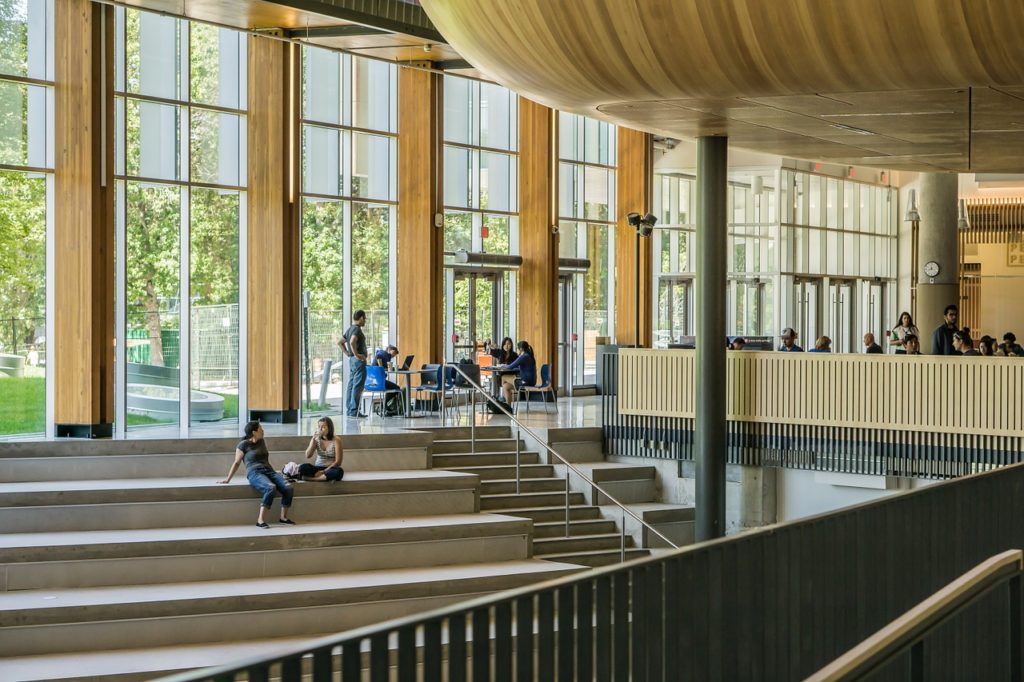- Calls to this hotline are currently being directed to Within Health, Fay or Eating Disorder Solutions
- Representatives are standing by 24/7 to help answer your questions
- All calls are confidential and HIPAA compliant
- There is no obligation or cost to call
- Eating Disorder Hope does not receive any commissions or fees dependent upon which provider you select
- Additional treatment providers are located on our directory or samhsa.gov
National Eating Disorder Awareness Week on College Campuses

Contributor: Crystal Karges, MS, RDN, IBCLC, Director of Content and Social Media at Eating Disorder Hope/Addiction Hope
Without a doubt, the college years can be among the most memorable of a person’s life. Many individuals come into their own during their time spent in college, forming greater autonomy and an individual identity, branching out to new experiences, working towards academic goals, and more.
However, the college years are an increased time of transition as well, which can be triggering to a student who might be susceptible to developing an eating disorder. While eating disorders are complex psychiatric illnesses influenced by a variety of factors, the college years can bring about many experiences that could potentially trigger eating disorder behaviors.
Resources on College Campuses
It is estimated that eating disorders commonly develop between the ages of 18 and 21 years of age, which is the primary age group of college students [1]. Studies on eating disorders among college students have demonstrated an increase in prevalence, with eating disorders among females increasing from 23 to 32% and from 7.9% to 25% among males [2].
With the prevalence of eating disorders among college students comes an increased need for mental health services on college campuses. According to the Anxiety Disorders Association of America, college students are increasing more services for mental health every year, with 95% of college campuses reporting an increase in the number of students who are using mental health services [3].
For many students, there are several barriers for seeking out help and treatment for eating disorders, including shame, guilt, and/or denial about what they might be facing, as well as overall lack of resources to support those who might be struggling.
For a college student who may not have health insurance or minimal financial resources for treatment, connecting with a professional can easily be pushed to the backburner.
However, eating disorders are fatal illnesses, with individuals with anorexia nervosa having a six-fold increase in mortality compared to the general population [4]. Resources for college students struggling with eating disorders are essential for help and intervention.
Answering the Call
In order to better understand the availability of mental health services on college campuses and to bring greater awareness to this issue, the National
Eating Disorder Association (NEDA) conducted a nationwide survey of college services pertaining to eating disorders [5].
Among the survey highlights, NEDA concluded that survey results were indicative of a need for greater resources and funding for college campuses in order to more effectively screen, refer, and treat college students who may be struggling with eating disorders or any form of disordered eating issues [5]. In response to a survey question that asked about the challenges institutions face in providing eating disorder services, 85% identified lack of resources as the greatest challenge [5].
Identifying this need, NEDA has sought to help provide programs and services to better support the needs of college campuses, including a National and Live Helpline, treatment referral network, and source of eating disorder information. In addition the many resources that NEDA has to help fulfill the public need for education and access to treatment for eating disorders, this organization has also implemented that National Eating Disorder Awareness Week (NEDAW), which is commonly seen on many college campuses.
National Eating Disorder Awareness Week (NEDAW)
In effort to bring greater attention, awareness, and education to the issue of eating disorders, NEDAW is often implemented on college campuses.
NEDAW is among  the largest eating disorders outreach efforts in the nation and gathers individuals from across the nation who are committed to raising awareness of eating disorders, including health care providers, students, families, eating disorder professionals, social workers, volunteers, and more.
the largest eating disorders outreach efforts in the nation and gathers individuals from across the nation who are committed to raising awareness of eating disorders, including health care providers, students, families, eating disorder professionals, social workers, volunteers, and more.
By setting aside one dedicated week each year, NEDAW raising a powerful force, drawing attention and awareness to a crucial issue and giving a voice to those who may be suffering in silence. Many colleges use NEDAW as an opportunity to shed light on the issue of eating disorders on college campuses and among students, as well as highlight services that may be available for those who are struggling.
If you are interested in learning more about how you can participate in NEDAW or bring this resource to your own college campus, visit the NationalEatingDisorders.org for more information!
Community Discussion – Share your thoughts here!
Has NEDAW been implemented in your college campus? If so, what has been the experience?
 About the Author: Crystal is a Masters-level Registered Dietitian Nutritionist (RDN) with a specialty focus in eating disorders, maternal/child health and wellness, and intuitive eating. Combining clinical experience with a love of social media and writing, Crystal serves as the Special Projects Coordinator for Eating Disorder Hope/Addiction Hope, where her passion to help others find recovery and healing is integrated into each part of her work.
About the Author: Crystal is a Masters-level Registered Dietitian Nutritionist (RDN) with a specialty focus in eating disorders, maternal/child health and wellness, and intuitive eating. Combining clinical experience with a love of social media and writing, Crystal serves as the Special Projects Coordinator for Eating Disorder Hope/Addiction Hope, where her passion to help others find recovery and healing is integrated into each part of her work.
As a Certified Intuitive Eating Counselor, Crystal has dedicated her career to helping others establish a healthy relationship with food and body through her work with EDH/AH and nutrition private practice.
References:
[1]: Hudson JI, Hiripi E, Pope HG Jr, Kessler RC. (2007). The prevalence and correlates of eating disorders in the National Comorbidity Survey Replication. Biological Psychiatry 61, 348–358.[2]: White, S, Reynolds–Malear, J., Cordero, E., “Disordered Eating and the Use of Unhealthy weight control methods in college students: 1995, 2002 and 2008” Eating Disorders– Journal of treatment and prevention: volume 19 Number 4 July-September 2011.
[3]: Anxiety Disorders Association of America, “An Audit of Mental Health Care at U.S. Colleges and Universities: Focus on Anxiety Disorders” Copyright 2007, Silver Spring, MD, www.adaa.org
[4]: Arcelus, J., Mitchell, A.J., Wales, J., & Nielsen, S. (2011). Mortality Rates in Patients with Anorexia Nervosa and Other Eating Disorders. Archives of General Psychiatry, 68(7), 724–731.
[5]: Eating Disorders on the College Campus, A National Survey of Programs and Resources. February 2013, https://www.nationaleatingdisorders.org/sites/default/files/CollegeSurvey/CollegiateSurveyProject.pdf
The opinions and views of our guest contributors are shared to provide a broad perspective of eating disorders. These are not necessarily the views of Eating Disorder Hope, but an effort to offer discussion of various issues by different concerned individuals.
We at Eating Disorder Hope understand that eating disorders result from a combination of environmental and genetic factors. If you or a loved one are suffering from an eating disorder, please know that there is hope for you, and seek immediate professional help.
Last Updated & Reviewed By: Jacquelyn Ekern, MS, LPC on September 6, 2016
Published on EatingDisorderHope.com

The EatingDisorderHope.com editorial team comprises experienced writers, editors, and medical reviewers specializing in eating disorders, treatment, and mental and behavioral health.

